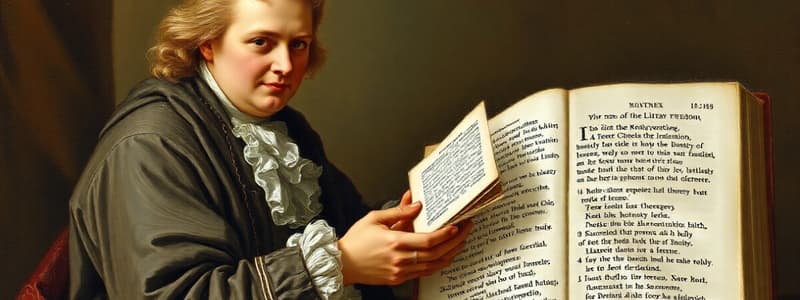Podcast
Questions and Answers
In which of the following sonnets does Milton conclude that some people 'also God' who 'only stand and wait'?
In which of the following sonnets does Milton conclude that some people 'also God' who 'only stand and wait'?
- Sonnet 7: 'How soon hath time'
- Sonnet 18: 'On the Late Massacre in Piemont'
- Sonnet 19: 'When I consider how my light is spent' (correct)
- Sonnet 23: 'Methought I saw my late espoused saint.'
- Sonnet 9: 'Lady that in the prime'
Milton was a Catholic who renounced his faith.
Milton was a Catholic who renounced his faith.
False (B)
The poem in which Milton mourns the loss of Edward King is __________.
The poem in which Milton mourns the loss of Edward King is __________.
Lycidas
From which work do the following lines come? 'The star-led wizards haste with odours sweet: O run, prevent them with thy humble ode...'
From which work do the following lines come? 'The star-led wizards haste with odours sweet: O run, prevent them with thy humble ode...'
Match the following works with their corresponding descriptions:
Match the following works with their corresponding descriptions:
Which sonnet discusses the theme of waiting on God?
Which sonnet discusses the theme of waiting on God?
Milton wrote primarily in the 18th century.
Milton wrote primarily in the 18th century.
What is the primary theme of Milton's elegy for Edward King?
What is the primary theme of Milton's elegy for Edward King?
The poem that calls for vengeance on those who have slaughtered saints is called on the late massacre in piemont
The poem that calls for vengeance on those who have slaughtered saints is called on the late massacre in piemont
Match the following Milton works with their themes:
Match the following Milton works with their themes:
Flashcards are hidden until you start studying
Study Notes
Milton's Sonnets
- Milton's sonnet 7, titled "How soon hath time," explores the passage of time and its impact on human existence.
- In sonnet 9, "Lady that in the prime," Milton addresses a woman and suggests that some people are "also God" and "only stand and wait."
- Sonnet 18, "On the Late Massacre in Piemont," is a powerful poem that condemns the massacre of Protestants in Piedmont.
- Sonnet 19, "When I consider how my light is spent," reflects on Milton's loss of sight and his dedication to serving God.
- "Methought I saw my late espoused saint" is the title of sonnet 23.
- The exam questions include questions on individual sonnets, requiring a thorough understanding of their themes and symbolism.
Milton's Religious Beliefs
- Milton was a Protestant, not a Catholic.
- He was a strong advocate for religious freedom and opposed Catholic teachings.
- Milton's religious beliefs heavily influenced his writing.
Milton's Major Works
- "Lycidas" is a pastoral elegy that mourns the loss of Edward King.
- The lines "The star-led wizards haste with odours sweet" are from "Ode On the Morning of Christ's Nativity."
- The lines "Avenge, O Lord, thy slaughter’d saints, whose bones" are from "On the Late Massacre in Piemont."
- These questions test your understanding of Milton's major works, including their content, style, and themes.
Passage Identification
- The exam will feature questions that ask you to identify excerpts from specific works by Milton.
- These questions will gauge your knowledge of his writing style, structure, and language.
- Practice identifying excerpts from the works discussed in class.
Milton's Works and Life
- Milton was a Protestant.
- Milton’s poems "On the Late Massacre in Piemont" (Sonnet 18) and "When I consider how my light is spent" (Sonnet 19) are both included in the text
- “Lycidas” is a poem by Milton mourning the loss of Edward King
Works and Themes
- The poem "Lycidas" is an elegy for Edward King.
- Milton’s Sonnet 7 "How Soon Hath Time" is the sonnet mentioned in the text.
- "Paradise Lost" is a poem by Milton about the rebellion of Satan and the creation of the world, Adam and Eve's Fall, and the consequences. The lines "See how from far upon the eastern road / The star-led wizards haste with odours sweet" are from Paradise Lost.
- The lines "Avenge, O Lord, thy slaughter’d saints, whose bones / Lie scatter’d on the Alpine mountains cold" are from "On the Late Massacre in Piemont."
- “On the Late Massacre in Piemont” is an elegy for the victims of the massacre of Protestants in Piemont.
Studying That Suits You
Use AI to generate personalized quizzes and flashcards to suit your learning preferences.




